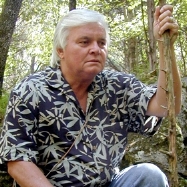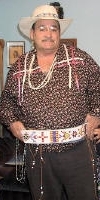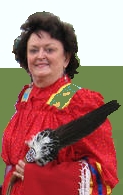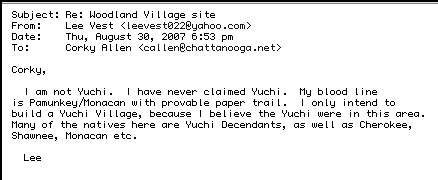| Tennessee's 105th General Assembly 2007-2008 | ||||
 |
House Bill 3299 by Rep. Nathan Vaughn D-Kingsport |
 |
Senate Bill 3123 by Sen. Tim Burchett R-Knoxville | |
State Government - Grants state recognition to certain Indian tribes and groups;
provides means for other Indian tribes and groups to receive state recognition.
- Amends TCA Title 4.
No Amendments [although a total replacement amendment was submitted (below) but not voted on.]
Fiscal Note for HB3299/SB3123 filed under SB3123 ["No fiscal impact on state or local governments."]
Bill History Section
|
| |||||||||||||||||||||||||||||||||||||||||||
AN ACT to amend Tennessee Code Annotated, Title 4, relative to | ||||
| WHEREAS, | The original inhabitants of North and South America were peoples who became known to European immigrants as Indians and, therefore, the original inhabitants of this state were members of various tribes of American Indians; and | |||
| WHEREAS, | These tribes have strongly influenced the heritage of this great State and have left their mark by way of names of rivers, mountains, towns, and counties, by introducing local crops and medicinal herbs, and in countless other ways; and | |||
| WHEREAS, | The Native American Indian culture in all its forms is manifested by the year-round Powwows and Festivals held across the country and the completion of the National Museum of the American Indian in the Smithsonian complex in Washington, D.C.; | |||
| WHEREAS, | This has been further manifested within the surrounding states of Virginia, North Carolina, South Carolina, Georgia and Alabama which have given recognition to the Native American Indian Tribes, Bands, Groups and Associations within their borders; and | |||
| WHEREAS, | The struggles of the Native American Indian Peoples including physical confinement, separation of families, suppression of language, traditions and culture as well as pervasive restrictions on arts, crafts, industry and agriculture have contributed to an economic disadvantage with which the Native American Indian People still contend; and | |||
| WHEREAS, | There is an economic benefit to the particular communities wherein the Native American Indians reside because of the ability of Native American Indians to impact positively tourism development, jobs, new economic development incentives, new health care opportunities, new education opportunities and to remove current barriers for Native American Indian Artists and Craft Persons to expand their trade in compliance with Federal law; and | |||
| WHEREAS, | Attorney General's Opinion No. 07-21 of 27 February 2007, stated: "Congress has acknowledged that state governments have the authority to recognize Indian tribes." "States have the authority to recognize Indian tribes as long as there is no conflict with federal laws. There is no conflict between Tennessee's recognition law and federal laws."; and | |||
| WHEREAS, | The Tennessee Legislature possesses the power to recognize Indian tribes, bands, groups, and Indian associations; | |||
| now, therefore, |
BE IT ENACTED BY THE GENERAL ASSEMBLY OF THE STATE OF TENNESSEE: | |||
| SECTION 1. | Tennessee Code Annotated, Title 4, is amended by adding Sections 2 through 5 as a new chapter thereto. | |||
| SECTION 2. | The general assembly hereby extends state recognition with full legal rights and protections to certain Indian-descended entities that have functioned in specific ways over time. | |||
| SECTION 3. | An Indian tribe, band, or group is a population of people related to one another by blood through their Native American Indian ancestry and tracing their heritage to a Native American Indian tribe, band, or group indigenous to Tennessee. Petitioners must submit a petition requesting state recognition specifying what type of recognition they seek. | |||
| SECTION 4. | In order to be recognized as a tribe, band, or group, the petitioner must present
| |||
| SECTION 4 [5]. | The general assembly hereby appoints the Confederation of Tennessee Native Tribes as the entity that shall review and present for recognition any tribes, bands, and groups which seek such recognition. (1) The Confederation of Tennessee Native Tribes is the formation of the Tribes and Clans of Native American Indians across the state who have joined together in one voice to represent the well-being of the Native American Indian in Tennessee; and (2) The Confederation of Tennessee Native Tribes is comprised of the Remnant Yuchi Nation, the Upper Cumberland Cherokee, the Chikamaka-Cherokee Band of the South Cumberland Plateau, the Central Band of Cherokee, the Cherokee Wolf Clan, the Tanasi Council of the Faraway Cherokee, the Native Cultural Council and the American Indian Association of Millington. | |||
| SECTION 5 [6]. | The general assembly recognizes for purposes of state Native American Indian recognition with full legal rights and protections the following tribes, bands and groups:
| |||
| SECTION 6 [7]. | This act shall take effect upon becoming a law, the public welfare requiring it. | |||

| Confederation of Tennessee Native Tribes members
| ||
| 1. not Yuchi not a Nation not a tribe or band |
 | Remnant Yuchi Nation / Educational Alliance (2007- *) "Chief" Lee Vest, 437 N Valley View Circle, Kingsport (Sullivan County) 37664 / remnantyuchination.org, .net, .com & appalachianconfederatedtribes.org owned by Billy Joe Nuckles, Kingsport previously Appalachian Intertribal Heritage Association (2003-06), Appalachian Confederated Tribes (2006-07) "Sunset the TN Commission of Indian Affairs" "Yuchi tribe hopes to put traditional village on Bays Mountain"
|
| 2. not Lenape not a Nation not a tribe or band |
Upper Cumberland Cherokee (2006- ) (also known as the United Eastern Lenape Nation (1983- )) United Eastern Lenape Nation, Middle Division Inc (1983-2007* "Administratively Dissolved") Herstle Cross, Oak Ridge; Bonnie Knuckles aka Chief Calmwaters of Corbin, Kentucky; Rt. 1 Box 22, Winfield (Scott County) 37892
Herstle Cross, Executive Director of the "Tennessee Native Tribes PAC" (TNT PAC) | |
| 3. |  | Chikamaka-Cherokee Band of the South Cumberland Plateau (2002- *) Eugene Parsons, Nathurst Street, PO Box 998, Tracy City (Grundy County) 37387 "Vice-Chief" James Everett Meeks, 520 Nathurst Street, PO Box 1209, Tracy City 37387 |
| 4. not a tribe or band |  | Central Band of Cherokee (also known as the Cherokee of Lawrence County) (2000- *) aka Sugar Creek Band of SECCI "Principal Chief" Joe Harlan "Sitting Owl" White, 393 Rabbit Trail Road, Leoma (Lawrence County) 38468 joe_white-msn.com
Congressional Reservation - This included part of the area in southern Middle Tennessee and all of West Tennessee, which was set aside by the U. S. Congress for the use of the Indian tribes. The area that included a small tip of Lawrence County was included in the Treaty of 1806 with the Chickasaw and the Cherokee. The rest of Lawrence County was included in the Treaty of 1816 with the Chickasaw and the Cherokee. - Types of Land Transactions & Other Terminology
2006 Recognition petition to Lawrence County / HJR 877 Recognition petition to 2006 state legislature / 2000 Letter to BIA of Intent to Petition (p42); Register of Incomplete Petitions, Not ready for evaluation: (awaiting TA [Technical Assistance] ltr) as of 2005 (p9) |
| 5. not Cherokee not Wolf Clan not a tribe or band |  | Cherokee Wolf Clan (2004- *) "Chief" Joe E. "ManyCoats" Walters, 16370 Hwy 424, Yuma (Carrol County) 38390, 731. 986.9166 josephmanycoats-cherokeewolfclan.org aka Cherokee Wolf Clan Universal Life Church (2003-2004), now Cherokee Wolf Clan Native American Church (2003- ) SJR 657 Recognition petition to 2004 state legislature / county recognition by Davidson County/Nashville, passed and repealed 2004; also recognized by: Roane County - 13nov2003, Van Buren County - 8dec2003, Lake County - 15dec2003 |
| 6. not a tribe or band |  | Tanasi Council of the Far Away Cherokee aka Faraway Cherokee Native American Inter-Tribal Association Inc. (NAIA-Memphis) (1984- *) PO Box 11473, Memphis (Shelby County) 38111 / farawaycherokee-bellsouth.net president Alice Henry, 2811 Ravenwood Drive, Bartlett 38134 "established in 1983 by the Cherokee Nation (Eastern and Western Bands)" |
| 7. not a tribe or band | Native Cultural Council - aka Native Cultural Circle (1998- *) Clarksville (Montgomery County); Douglas G. Kirby, 131 Creekside Court, Gallatin 37066 | |
| 8. not a tribe or band | American Indian Association of Millington (1988- ) Lee Overturf, 208 Country Meadow Lane, Atoka (Tipton County) 38004
| |
* registered with Tennessee Secretary of State as a corporation
|
